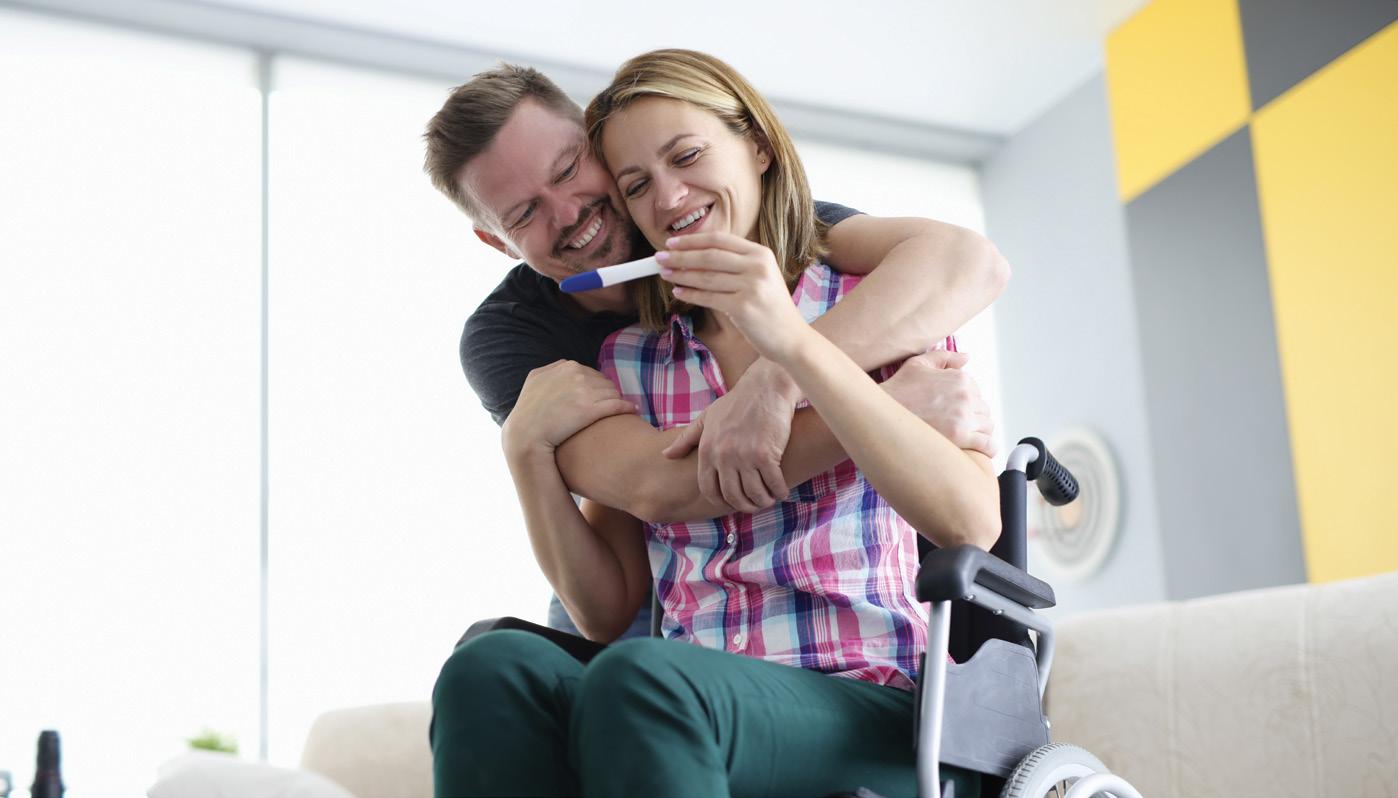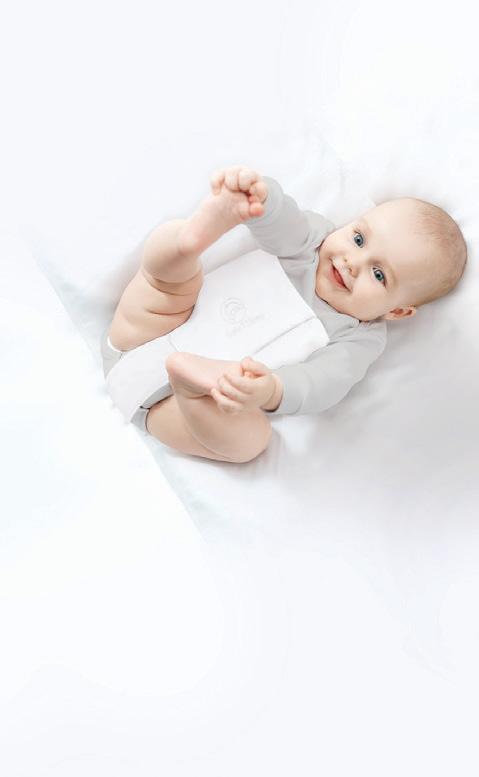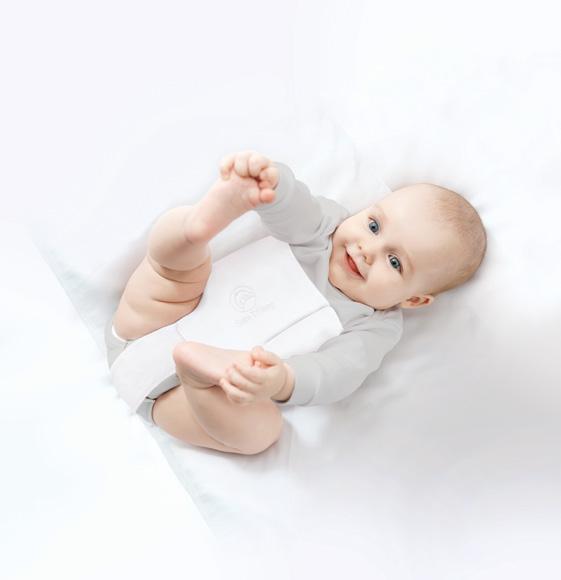
9 minute read
PREGNANCY, BIRTH, BREASTFEEDING, AND DISABILITY
The vision of the New Zealand Disability Strategy 2016-2026 is: “New Zealand is a non-disabling society – a place where disabled people have an equal opportunity to achieve their goals and aspirations, and all of New Zealand works together to make this happen”.
Non-disabling is a term used deliberately in the strategy, as it recognises the importance of removing the barriers in society for disabled people who have impairments. Using this term is considered to be a stronger and more meaningful message than talking about ‘enabling’. Enabling suggests support to help disabled people navigate around barriers, rather than a focus on removing barriers. Removing barriers to maternity care experienced by disabled women will be of interest to midwives who are already providing care to disabled women, and nondisabling aspects of care are interesting to explore. Stats New Zealand (2013) reported that one in four New Zealanders were limited by a physical, sensory, learning, mental health, or other impairment, and women were more likely to experience physical disability than men (20% compared to 15%). Disabled people, in particular women, were also more likely to experience violence than non-disabled people.
There has been some research looking at disabled women and their needs when pregnant, birthing, breastfeeding and parenting. More understanding of the issues affecting disabled women and their families would be valuable in terms of aiding not only the development of services to meet their specific needs where necessary, but also in removing barriers, rather than merely providing support to navigate barriers - this being the ultimate goal expressed in the Disability Strategy.
SELECTED RESEARCH SUMMARY –A FOCUS ON BREASTFEEDING
Guerin et al (2017), in a New Zealand study, found that disabled women encountered a range of economic, attitudinal, and knowledge barriers in relation to becoming mothers. A shortage of evidence in regards to the issues disabled women have to confront when accessing maternity services was also noted. Health professionals also reported difficulties in providing maternity-related services to disabled women. There may be a number of issues affecting pregnant women, and breastfeeding mothers with disabilities, which include concerns about medications that may affect the infant, access to existing services including childbirth education, and specific issues for wheelchair users. Stigma still exists towards disabled women becoming mothers, but becoming a mother has been reported as affirming for disabled women (Guerin et al, 2017). Lezzoni (2017) found that for women with mobility disability, there was a degree of fear about whether childbirth could be successful, and a lack of trustworthy information was also reported.
A recent study in the Lancet (Brown et al, 2023) looked at disability and in-hospital breastfeeding practices in Ontario, Canada. The population-based cohort included 634,111 women of whom 54,476 (8.6%) had a physical disability, 19,227 (3.0%) had a sensory disability, 1,048 (0.2%) had an intellectual or developmental disability, 4,050 (0.6%) had multiple disabilities, and 555,310 (87.6%) had no disability. Disparities in breastfeeding outcomes between those without a disability, and those with intellectual, developmental, or multiple disabilities was found. The researchers looked at practices and supports for breastfeeding based on the WHO/UNICEF Baby Friendly Hospital Initiative guidelines, which included early initiation of breastfeeding, motherbaby skin-to-skin contact and assistance with breastfeeding. The study conclusion was that more could be done to increase breastfeeding rates, particularly for women with intellectual or developmental disabilities, or multiple disabilities. One weakness of this study was the lack of knowledge about the women’s breastfeeding intentions.
Twenty-five mothers with physical disabilities in the US were interviewed about their experiences related to the facilitators and barriers to breastfeeding (Powell et al, 2018). The participants reported a range of disabilities including multiple sclerosis, spina bifida, cerebral palsy, stroke and muscular dystrophy. Facilitators for breastfeeding included adaptations and equipment –the importance of finding a position for breastfeeding that worked, the need for pillows, the need for a breast pump for some women who could not find a position that worked for breastfeeding and /or did not have the physical strength to hold their babies for a full breastfeed, receiving physical assistance from others to support the baby during feeds, and support from peers who had similar experiences.
Barriers included: lack of support for breastfeeding; lack of information about medication and the potential interactions with breastfeeding-which caused concerns for some mothers who then did not breastfeed; limited information about breastfeeding among mothers with physical disabilities; disability-related difficulties with milk supply which were related to delayed breastfeeding initiation in some cases; and difficulties with latching the baby at the breast, which were mostly related to disability and positioning problems. Recommendations from this work were to address the facilitators and barriers, and to develop resources for breastfeeding women who have a disability, as well as resources for health care providers. Warkentin et al (2019) found that the most commonly reported breastfeeding challenge for women with physical disabilities was positioning the baby. Pillows and physical support from a partner were the most reported techniques used to facilitate breastfeeding, and the underarm (football) hold was described as the least beneficial position by women. A need for optimisation in the support and care provided to women with physical disabilities was recommended by König-Bachmann et al (2019).
Women with learning disabilities face different challenges. Johnson et al (2021), in a scoping review, found that tailored support for infant feeding was necessary along with accessible resources. There was a high level of agreement in the papers identified about the importance of using easily read visual images within resources. Some women wanted healthcare providers to give practical demonstrations. The importance of healthcare providers checking understanding was emphasised as important.
REMOVING BARRIERS –NON-DISABLING ENVIRONMENTS
Staying independent and in control during pregnancy and birth, sharing decisionmaking, and finding a maternity provider who was respectful of autonomy and the rights to make decisions, were identified as important for disabled women in an Australian study (Blair et al, 2022).
Midwifery care in Aotearoa takes place in partnership with women and is provided in a way that is intended to be flexible, creative, empowering and supportive. Midwives also accept the rights of women to control their pregnancy and birthing experiences, and they uphold the right to informed decision-making and consent throughout the childbirth experience. This philosophy is entirely consistent with the expressed desire for autonomy, communication, and individualised care by the participants in the Blair study. The majority of disabled women in this study also wanted “to just fit in” and to receive care in a similar or identical manner to those without disabilities. They resented an ‘at risk’ label on account of their disabilities when it was not medically indicated.
Midwives also accept the rights of women to control their pregnancy and birthing experiences, and they uphold the right to informed decision-making and consent throughout the childbirth experience.
The creation of enabling environments by the reduction of physical access barriers was also discussed. Adjustable height examination tables, accessible weighing scales, and accessible baby cots were identified as ways to reduce anxiety and increase independence. Inaccessible weighing scales resulted in women not being weighed regularly, or at all, which caused anxiety in women concerned about their weight gain (Blair et al, 2020). Women valued providers who considered their feelings and needs, and appreciated a flexibility of approach. One woman suggested that health providers needed to listen to what women tell them about what they want and not request that women do things, but rather ask them if they can do things, and to not tell women about policies without explaining how they can be adapted, and/or why they are recommended in that way (Blair et al, 2022).
The development of accessible resources is important. In the UK, Best Beginnings provide information for parents with disabilities and parents with learning disabilities. The UK Best Beginnings Baby Buddy app has an option for speech to be read aloud, using simple and clear language, pictures and videos. In Aotearoa, the
BreastFed NZ and Mama Aroha apps have useful images and simple diagrams that can be used to aid discussion. Aotearoa also has the Baby Friendly Hospital Initiative and the Ten Steps to Successful Breastfeeding which can support early initiation of breastfeeding, mother-baby skin-to-skin contact and tailored support for breastfeeding.
Conclusion
The Convention on the Rights of Persons with Disabilities (2006) is a human rights instrument aimed at changing attitudes and approaches to disabled people. Aotearoa signed the Convention in 2007 and ratified it in 2008. Principles of the Convention include respect, freedom to make choices, full and active participation in society, equality and accessibility. Article 6 of the Convention is specific to women with disabilities and part of a future vision includes removing the barriers to sexual and reproductive health services for disabled women. The UN Committee on the Rights of Persons with Disabilities released a list of issues for Aotearoa in March 2018. Four main themes of the complaints from disabled women were related to IVF, postnatal depression, the effects of mental health perceptions of the ability to care for children, and workrelated problems related to women’s health, including endometriosis (Beard, 2019).
Whaikaha – a new Ministry of Disabled People, has been set up in partnership with the community, and Māori, to help transform the lives of disabled people. Supporting disabled people will be guided by using the Enabling Good Lives approach, and giving disabled people greater choice and control over their lives is an expressed aim.
Protecting birth physiology and supporting a positive childbirth experience has been a cornerstone of midwifery practice, with the aim of improving the health and wellbeing of all mothers and infants. More information about the issues that may affect pregnancy, breastfeeding, and parenting for disabled people would be significantly valuable. Redshaw et al, reported in 2013 that women with disabilities had to some extent been an invisible population within maternity. Stats NZ are conducting a new survey about disability this year, but the results of this may have limited relevance to midwives and midwifery care as questions about pregnancy are unfortunately not included, and midwives are not on the list of health professionals seen in the last 12 months. A question about unmet needs will be included, which could potentially generate some information, although the focus seems to be more on difficulties accessing a health care provider, rather than barriers experienced in health care systems (Stats NZ, 2023).
An Australian study investigating how disabled women were identified within maternity services was described as being the first to explore this issue in Australia (Benzie et al, 2022). A large variation in disability identification practices was found in the maternity systems and a recommendation was made to develop national guidelines and ensure routine collection of this information to support service development. Exploring these issues of relevance to disabled women and maternity stakeholders in Aotearoa could be transformational – and non-disabling. square
References available on request.
New Zealand College of Midwives Directory
President
Nicole Pihema Ph 021 609 011 nicolepihema@gmail.com
National Office
PO Box 21-106, Christchurch 8140 Ph 03 377 2732 Fax 03 377 5662 nzcom@nzcom.org.nz www.midwife.org.nz
College Membership Enquiries
Contact Lisa Donkin membership@nzcom.org.nz 03 372 9738
Chief Executive
Alison Eddy
Auckland Office and Resource Centre
Delia Sang, Administrator Yarnton House, 14 Erson Avenue PO Box 24487, Royal Oak, Auckland 1345 Ph 09 625 9764 Fax 09 625 0187 auckadmin@nzcom.org.nz
National Board Advisors
Elder: Sue Bree
Kuia: Crete Cherrington
Education Advisor: Tania Fleming tania.fleming2016@gmail.com
Regional Chairpersons
Auckland Jacquelyn Paki, Mel Nicholson auckchair@nzcom.org.nz
Bay of Plenty/Tairawhiti Cara Kellet chairnzcomboptairawhiti@gmail.com
Canterbury/West Coast
Sheena Ross chairnzcom.cantwest@gmail.com
Central
Julie Kinloch Ph 06 835 7170 julie.kinloch.nz@gmail.com
Nelson/Marlborough
Karen Hall tetauihunzcom@gmail.com
Northland
Christine Byrne tetaitokerauchair@nzcom.org.nz
Otago
Jan Scherp, Charlie Ferris otagochair@nzcom.org.nz
Southland
Liz Whyte liz.whyte@netspeed.net.nz
Waikato/Taranaki
Jenny Baty-Myles chairwaikatonzcom@gmail.com
Wellington Suzi Hume chair@wellingtonmidwives.com
Regional Sub-Committees
Hawkes Bay Sub-Committee Linley Taylor midwife.linley@gmail.com
Manawatu Sub-Committee Jayne Waite j.waite70@gmail.com
Taranaki Sub-Committee Ange Hill nzcom.taranaki@gmail.com
Wanganui Sub-Committee Susan O'Connell susan.cleland@hotmail.com
Horowhenua Laura McClenaghan midwife.laura@hotmail.co.nz
Consumer Representatives
Royal New Zealand Plunket Society Zoe Tipa zoe.tipa@plunket.org.nz
Home Birth Aotearoa
Bobbie-Jane Cooke bobbiejane.homebirth@gmail.com
Parents Centre New Zealand Ltd
Liz Pearce Ph 04 233 2022 extn: 8801 e.pearce@parentscentre.org.nz
Student Representatives
Penny Martin pennymartin79@live.com
Ana Ngatai ana.olsen.ngatai@hotmail.com
Resources for midwives and women
The College has a range of midwiferyrelated books, leaflets, merchandise and other resources available through our website: www.midwife.org.nz/shop
Ngā Māia Representatives www.ngamaia.co.nz
Jay Waretini-Beaumont midwifejay@gmail.com
Lisa Kelly lisakellyto@yahoo.co.nz
Pasifika Representatives
Talei Jackson Ph 021 907 588 taleivejackson@gmail.com
Nga Marsters Ph 021 0269 3460 lesngararo@hotmail.com
MERAS / General Enquiries & Membership
PO Box 21-106, Christchurch 8140 www.meras.co.nz
Ph 03 372 9738 meras@meras.co.nz
MMPO mmpo@mmpo.org.nz
Ph 03 377 2485 PO Box 21-106, Christchurch 8140
Rural Recruitment & Retention Services
Rural contact: 0800 Midwife/643 9433 rural@mmpo.co.nz
100%SAFETYRECORDEST.1992
Comfort and safety for babies newborn-2 years
More restful, safer sleep and helps prevent flat head
• More restful, safer sleep limb and hip movement
Goes over any type of swaddling, sleeping bag or sleepwear, for a snug and more restful sleep


• Ensures swaddling, sleepwear, Sleepingbag use is safer and cosier
Natural, flexible body, limb and hip movement safely lasts two babies aged 0-2 yrs
• Excellent for babies requiring varied sleep positions or cot elevation est 1992 Helps keep young babies comfortably o the tummy; older babies turn freely within the wrap
*
The World’s Safest Baby Wrap
Use code ‘NZCOM’ for 20% OFF
* www.safetslee w w safet sleep com







